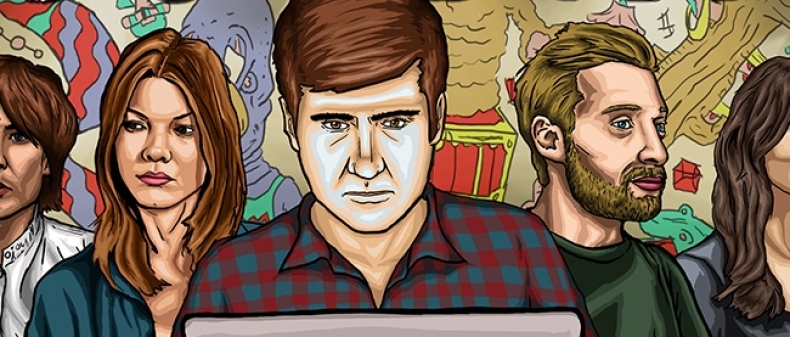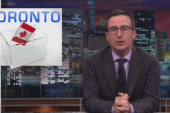
Photo by Emma McIntyre; illustrated poster in the cover image is by Justin Cozens
Last summer, Pavan Moondi and his producing partner, Brian Robertson, had everything ready to go for the production of Everyday is Like Sunday, a micro-budget web series about Torontonian 20-somethings trying to find meaning while juggling their professional, romantic, and personal lives. Moondi wrote the script with a friend, Michael Sloane. He and Brian shared production duties. The money had been raised. On the eve of production they had a director flying in from Vancouver and an actor arriving from New York.
One year later and a lot has changed. Everyday is Like Sunday is now a feature film that’s finally seeing a release. Moondi is credited as both writer and director, and the lead actor, David Dineen-Porter, is not the American ringer once meant for the role. Yet, at the core, Everyday is Like Sunday hasn’t changed much. It wears its budgetary limitations on its sleeve as it tells the story of Mark (Dineen-Porter), Jason (Adam Gurfinkel), and Flora (Coral Osborne), three University graduates in the city’s west end trying to figure out their lives. The cast also features Nick Thorburn, aka Nick Diamonds of Islands, Dan Werb of Woodhands, and a soundtrack full of independent music.
I had a chance to sit down and talk to Pavan about the challenges of making a micro-budget indie film, what it means to make a “Toronto film,” how music and musicians played an important role, and his complicated relationship with HBO’s Girls.
Everyday Is Like Sunday opens tomorrow at the Carlton Cinema. You can find more info and purchase tickets at the official website.
Toronto Standard: As you mentioned in the press notes, this film is about post-collegiate life and the economic and emotion doldrums of people in their 20s trying to find a path for themselves. Now, you’re a 20-something creative person, could the film be considered autobiographical?
I don’t think so. I think the starting point might have been autobiographical, but I felt no allegiance to facts. When I wrote it, which was two years ago–actually, more than two years ago now–I was in that state where I was trying to get a job in the film industry, but I didn’t go to film school. So I was toiling around, trying to find anything, like working in call centres and just scraping by. I was lucky enough to get an internship at iThentic, which is the company that ended up making this film. So I just kind of put my time in there and paid my dues, I suppose, until I could get something else going and could build up experience.
But I don’t think it’s autobiographical. I think it’s truthful. There’s this Gary Shandling quote about the Larry Sanders show about how comedy is about getting the truth, so the truth is the most important thing, but the truth is not the facts. It’s more about the feelings than the events themselves. I think I’ve felt, at one point or another, how each one of those characters feels.
What about the character’s and their post-collegiate struggle to find meaning in their lives, is that unique to this generation, which, I suppose, is our generation?
I feel like everybody, at some point in their life, every generation, has gone through that. Look at all those Gen X movies. They’re all dealing with the same stuff that we’re dealing with. It’s just that the mask over it is particular to our generation. It’s texting and job hunting online instead of going to places with your resume. I don’t think you need to be between 25 and 35 to get the film or anything.
Do you look at the making of this film as an attempt on your part to break out of those doldrums? Is the fact that you made it an achievement in itself?
Yeah, it was a huge achievement because I spent so long trying to get it made and it went through so many iterations. Like, I originally came up with the basic premise, I think, four years ago as a television series. The idea, then, was “Hey, why don’t I try to make a Canadian TV show that I would watch and that my friends would watch, and that would be about young people.” I went to every Canadian production company and pitched them on this idea that there’s this huge untapped market that nobody is trying to appeal to. Somebody told me that no one wants to see young people on TV who are struggling, like, who are slackers. “Nobody wants to see that. It’s just a bad idea. Put it in a drawer and move on to the next one.” And then about a year later, Girls premieres…
I was about to say…
Yeah. So my relationship with Girls is complicated because when I had this idea, everyone was telling me it’s not viable, and then I remember reading in Variety that HBO was developing a show about this, and it was just a one sentence line and it sounded exactly like what I had. That’s when I started thinking, maybe it should just be a web series, because at the time, like two and a half years ago, it was really fertile ground and it hadn’t quite burst yet. So I wrote it, kind of as a narrative serialized web series, although I had it in my head that it would work as a film as well, but I was pushing it as a web series and that’s how we got it funded. The company that funded it, iThentic, they’re a web series producer.
You managed to get this film independently financed without government or arts council help, so was that primarily through iThentic?
Yeah, when we went to them, our clock was running out, so we had some musicians involved and we basically were set a deadline where it was “Listen, I can do it up until this date, but if you can’t get it going by this date then I have to go work on an album, and it might be six months before I’m free again.” That’s when we went to iThentic and basically we told them “Listen, we have to start shooting in two weeks” and they kind of mulled it over for two days and then they just wrote us a cheque and said “see you later.” I think it’s just a result of the timing, where if you want to go through the grant system or various funds, you need lead time of like a year to apply to everything effectively. I think if we had waited another year, it would have just been stale, and there’s tons of Girls rip-offs coming out constantly.
So you had a lot of local musicians and comedians in the film. Were they integral in finding money for the project?
The reason we got musicians is because, one, we didn’t want to do a union shoot, so immediately that cuts out 80% of actors that are available to you. With musicians you know you’re getting people that are at least somewhat charismatic. You know you’re getting a right personality type to work quickly and who are used to the way we work, which is like an indie band on tour and not having glamorous accommodations.
But it was absolutely also a funding decision. When you’re trying to raise money, you need to point to exactly how you’re going to recoup that investment. You need to have people with some notability to help you stand out, especially when you’re making a web series, because the market is so saturated that you see tons of amazing web series that are just buried on YouTube and the good stuff doesn’t necessarily rise to the top. You need some type of edge.
I cast Nick Diamonds because I had talked to him about scoring the film at one point, and so it was just like an informal thing, like “When we get this together, can you score it?” And he was like “Yeah, yeah, I’m interested.” Then I went to see his band play, and I was watching the show and in between the songs, he was just killing it. It was almost as if he had a stand up routine. So I just kind of sent him a message and was like “How about you act in this instead of doing the music?” and he was down right away.
So the soundtrack is full of Toronto indie bands and musicians…
Some of it is, some of it isn’t. Islands is Montreal. Wild Nothing is American…
How did you end up getting rights to all these songs. Were they pretty open to it, or was it a hassle?
The smaller bands were definitely open to it, but we have a few big bands. Islands we got because Nick is in the film. I was shocked that we got Wild Nothing, because that was a song that I wrote into the script two years ago never expecting that we would get it, but their record label was supercool and just let us have it. I think, for a film like this, which doesn’t have a big machine behind it–our post-production team was like four people–bands and record labels and musicians can relate to what we’re doing, because we’re basically an indie band that, instead of making music, we made a film in the past year.
The original director was also a musician. Can you tell me what happened there and why he’s not the director any more?
Another one of the reasons that I think we got the funding was that the original director was a musician, Blaine Thurier [keyboardist of The New Pornographers]. I wanted to approach it kind of like a television series, where the directors come in and you can have multiple directors and it’s just more about making sure everything gets done and that the script is reflected on the screen. I figured, you know, “I’ll direct two episodes and I’ll get Blaine to come in and direct eight, and that’ll help us get the money together. I think that helped us, but once we started filming, we just ran into major issues…
Actually, there’s another part of this story, too, where our original lead actor was Justin Rice from Mutual Appreciation, the Bujalski film. It was a huge “get” for us when we got him. We got the cheque and we rented a house in Parkdale for everyone to live in and to shoot in and to put it all together. We flew in Blaine from Vancouver, we flew in Nick from LA, and then we were bringing Justin in on a train from New York. Everyone was at the house, we were doing table reads, and I got a call from Justin saying that he was stuck at the border and there was an immigration issue, and he couldn’t get in to the country.
We were freaking out, because we start filming tomorrow and we have no actor and the whole thing is in disarray. It’s all on the verge of falling apart. Luckily we had a Rolling Rock sponsorship, so we had 200 tall cans of beer at the house, so everyone just started getting wasted in misery, like “What are we gonna do!” We needed a body to act as the lead in this film, just so we wouldn’t get sued and we could finish it, and we went to Get Well, and to all these bars just soliciting all these random guys “Are you interested in acting? We start tomorrow and you have to memorize all these lines.” and we weren’t getting anywhere.
So we shot the first day. Blaine directed the first day, and it was a little rough. I think he kind of envisioned it more as a improvised comedy–like, really broad improvised comedy–and I wanted to emphasize a little bit more of the dramatic side of it. So we had to sit down and be like, this is off the rails. Luckily, we found an actor, David Dineen-Porter, who was recommended to us, and he came in, and he gave an amazing audition, and we decided that Blaine and I would co-direct the film.
Part of the problem was we were shooting so out of order that the emotional content was being lost. The actor, DDP, came in so late that he had no time to prepare. I think he shot the whole film without actually having read the script, because he was too busy. He was doing our film and he was doing a YTV show and working like 19-hour days between the two of us. There was just no time. I think he needed someone who was really, really familiar with the material for us to get it right, and that’s why we decided to co-direct it,.
And how did it all work out with Blaine after that?
Because I was also in charge of the edit, I just left in what I thought was good, and it ended up being 99 per cent of what I had done, so when I sent it to [Blaine] he didn’t want his name on it. Then it just became my thing, which is OK, even though I think there’s stuff in there I wish had been done differently. But it’s really minimal and the final product is mine. I stand by it and I’m proud of it. I don’t want this to sound like I’m trashing Blaine at all, I just think it was not the right fit for the material. I think there was a generation gap for sure. He’s 45 years old and he’s a rock star. He’s not going to remember what it’s like to not be able to get a job.
But it was a really rocky road, and you always hear that independent film story of “It was like summer camp and everyone was friends and we just did this thing together. We went to a cabin and it was like a wonderful experience.” That is not our film. People were snapping at each other, and on edge because everyone just had so much on the line. I had been working on this for four years. The actors just didn’t want to be embarrassed by what was happening, and Blaine saw his credibility could go out the window if this was bad. Luckily we had that beer sponsorship, so there was fun to be had, it just meant that every night after shooting, everyone would get wasted and we would have parties. We consider it a miracle that the film is done and that we’re as happy with it as we are, because there were numerous times in the past year where we thought it was going to have to be buried and we were not going to be able to finish it, but it came together somehow.
Was it important for you that this be a “Toronto film,” or that it be set in Toronto?
I hope this doesn’t sound dickish, but… no, it wasn’t. It was something that happened organically, because there was nothing in the script, really, about being a “Toronto film,” and that wasn’t an MO at all. We were just thinking of how best to define these characters. The idea of them living in an urban environment with a creative hotbed is an important context to have. That’s when we thought about “OK, we really need to establish where they are, but do it it in an organic way.”
I feel like sometimes other films do the polar opposite and it’s always too much or too little, where they go to extreme lengths to cover up the fact that it’s Toronto, and it’s just like any city in the USA, or sometimes it’s the opposite, where it’s like “We’re in Toronto, now. We need to do this! Look at where you are! This is Toronto!” We didn’t want to do that. I don’t think we actually even say the word Toronto in the film. It’s very clearly Toronto. I think there’s a shot of the CN Tower at one point. But it happened organically, and that’s what I like about it. I think it comes off naturally. The best way to make a “Toronto film” is by not trying to make a “Toronto film.”
____
Alan Jones writes about film for Toronto Standard. You can follow him on Twitter at @alanjonesxxxv.
For more, follow us on Twitter @TorontoStandard and subscribe to our newsletter.














